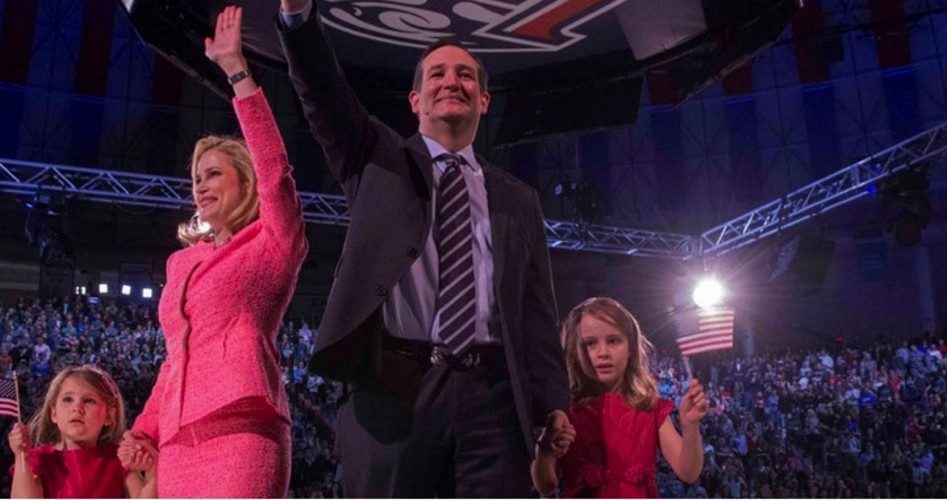
In a statement released on March 17, the campaign of presidential candidate Senator Ted Cruz (R-Texas) announced “a high-profile national security coalition that will advise Cruz (shown) on foreign policy issues.” The announcement spotlighted three members of the team — former Senator Jim Talent (R-Mo.), former federal prosecutor Andrew McCarthy, and former Assistant Secretary of State Elliott Abrams.
Of these, Abrams is the most problematic for constitutional conservatives, who are Cruz’s staunchest supporters, since Abrams is the very personification of the “Washington establishment” that Cruz has frequently condemned.
The biographical information for Abrams offered in the Cruz announcement notes:
Elliott Abrams was an assistant secretary of state in the Reagan administration and a deputy national security advisor in the George W. Bush administration; he is a senior fellow for Middle Eastern Studies at the Council on Foreign Relations.
Apparently, the Cruz campaign believes (perhaps justifiably so) that so few conservatives know anything about the Council on Foreign Relations (CFR) that it is no longer considered to be politically risky for a conservative, self-proclaimed “anti-establishment” candidate to openly place a man who is not merely a CFR member — but a CFR senior fellow — in a prominent slot.
Maybe Christian economist Gary North was correct about the relative obscurity of the CFR when he wrote in a column for LewRockwell.com four years ago:
The story of the CFR is well known to those of us who have been in the conservative wing of the party for over 50 years. It has been over half a century since Dan Smoot wrote The Invisible Government (1960). In late 1964, Robert Welch of the John Birch Society shifted his entire life’s work from anti-Communism to anti-conspiracy, and forced the restructuring of the Birch Society’s magazine, American Opinion. The story of the CFR/Federal Reserve alliance has been known to the hard-core Right for a generation. But it is still not known to the standard conservative, who came into the movement in 1980 or later. [Emphasis added.]
We will get back to the CFR shortly, and also look at some of the other members of Cruz’s new National Security Team. This statement from Cruz was included in the announcement:
I am honored and humbled to have a range of respected voices willing to offer their best advice. These are trusted friends who will form a core of our broader national security team. After two terms of a failed Obama-Clinton foreign policy, our allies are confused and frightened, and our enemies are looking for opportunities. This is the moment for all those who believe in a strong America that is secure at home and respected abroad to come together and craft a new path forward.
Chad Sweet, a former DHS and CIA official and chairman of the Ted Cruz for President Campaign, said of the new advisors: “The national security experts who are endorsing him today are all highly respected professionals who share Senator Cruz’s vision of how we will restore America’s leadership in the world.”
Of the two other members of Cruz’s new team mentioned prominently in the announcement, Talent was a foreign policy advisor to Republican presidential nominee Mitt Romney during his failed 2012 campaign and was perhaps the only Romney advisor with any type of conservative credentials, serving as a distinguished fellow at the Heritage Foundation.
The other, Andrew McCarthy, a former assistant U.S. attorney for the Southern District of New York, is a contributing editor to the neoconservative journal National Review. Back in 2012, McCarthy rashly criticized The New American for our exposé of the attacks on liberty posed by the extraordinary power granted the president of the United States by the NDAA (National Defense Authorization Act). (A complete account of McCarthy’s attack on The New American is found in the article: “Is The New American “Absurd” to Expose the NDAA? One Writer Says Yes.”)
Two other members of the team are also CFR members:
Stewart Baker, who served as assistant secretary for policy at DHS, as general counsel of the National Security Agency, and as general counsel of the bipartisan commission that investigated intelligence failures involving WMD and Iraq, and
Michael Pillsbury, who was a Reagan campaign advisor in 1980, served as assistant undersecretary of defense for policy planning under President Reagan, and is the author of three books on China.
The others represent varying degrees of conservatism or neo-conservatism. A representative sampling includes:
Ilan Berman, vice president of the American Foreign Policy Council, which includes on its board of directors, Robert McFarlane, former national security advisor to Ronald Reagan, who is a CFR member, and Newt Gingrich, former speaker of the House and a CFR member.
Mike Gonzalez, a former speechwriter for the Bush administration and editorial writer for the Wall Street Journal, Charles “Cully” Stimson, a former deputy assistant secretary of defense for Detainee Affairs, and Steven Groves are fellows at the Heritage Foundation, giving them conservative credentials they share with Jim Talent.
Mary Habeck is a visiting scholar at the American Enterprise Institute (AEI), where she studies al-Qaeda, ISIS, and jihadi-salafism. AEI is regarded by many as the most influential think tank associated with neoconservatism. Irving Kristol, the “godfather of neoconservatism,” was a senior fellow at AEI.
While some members of the Cruz advisory team, especially those associated with the Heritage Foundation, genuinely qualify as conservatives, the presence of CFR members Abrams, Baker, and Pillsbury does seem to be a larger number than mere coincidence might suggest.
As for why the presence of these CFR members should concern Cruz’s constitutionally conservative supporters, it is necessary to expand on North’s statement quoted above: “The story of the CFR is well known to those of us who have been in the conservative wing of the party for over 50 years: To provide a condensed version of that story, it is necessary to go back to the time of the CFR’s founding, in 1921. The beginnings of the CFR originated in the closing years of World War I, when President Woodrow Wilson commissioned a group of about 150 scholars called “The Inquiry” to develop a plan for the world after the defeat of Germany. A key part of this plan was the creation of a League of Nations. However, the U.S. Senate, fearful that membership in such a world body would threaten U.S. sovereignty, voted to reject membership in the league on November 19, 1919.
In an attempt to further Wilson’s aims, members of the international group of scholars formed the CFR in New York on July 29, 1921. Following World War II, CFR members were instrumental in forming the United Nations to replace the League of Nations, and this time were successful in getting the United States to enter this world body. Since then, CFR members have become very influential in steering the course of U.S. foreign policy in an internationalist, interventionist direction, and it members have occupied key Cabinet positions in both Democratic and Republican administrations. CFR members have included political leaders from both parties, more than a dozen secretaries of state, CIA and national security directors, and leading financial, academic, and media figures.
For an illustrative example of how thorough the CFR influence is, we must consider the answer that Donald Trump gave when he was asked by Moderator Bret Baier during the March 3 presidential debate;
Mr. Trump, you’ve repeatedly deflected calls for specific national security or defense policy plans with the claim that you’ll ask the best people when you become president, and take their advice.
So who are the best people? Can you reveal two or three names that you trust for national security?
Trump replied:
I think Richard Haass is excellent. I have a lot of respect for him. I think General Keane is excellent. I think that there are — I like Colonel Jacobs very much. I see him. I know him. I have many people that I think are really excellent but in the end it’s going to be my decision.
Trump, therefore, named three people he would seek foreign policy advice from. Of these, Richard Haass is in his 13th year as president of the Council on Foreign Relations.
The second man Trump named, John M. “Jack” Keane, is a retired four-star general and former vice chief of staff of the U.S. Army. He is now a defense analyst currently serving as chairman of the board for the Institute for the Study of War. Keene is also a CFR member.
Trump’s third choice, Jack Howard Jacobs, is a retired U.S. Army colonel who currently serves as a military analyst for NBC News and MSNBC. And Jacobs, like the others, is a CFR member.
In the upcoming presidential election, therefore, we will likely see either Trump or Cruz as the GOP nominee, and both men have sought out the advice of CFR members. Cruz’s wife, Heidi, was also a CFR member and also was a member of the task force that was tapped by the CFR to analyze the proposals for the establishment of a North American Union.
As for the presumptive Democratic nominee, Hillary Clinton, her husband the former president, Bill, is a CFR member, as is their daughter, Chelsea.
A suspicious voter might easily think that the deck is stacked for the upcoming election, only instead of being filled with extra aces, it is filled with extra CFR cards.
Related articles:
Trump, Cruz, and the Establishment
TPP Power Grab: World Bank, Goldman Sachs, CFR
CFR Globalists Outline Strategy for “North American Community”



